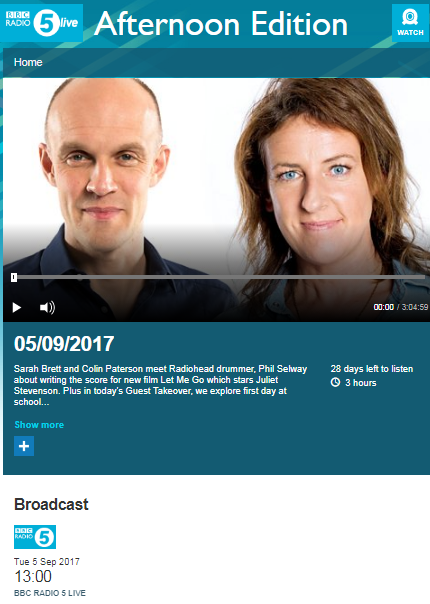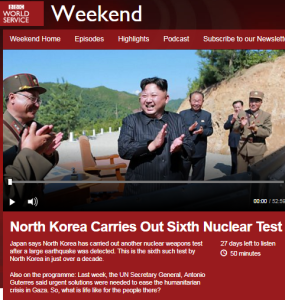The BDS campaign’s (failed) crusade against a concert by Radiohead in Israel began to receive BBC promotion five months before its scheduled July date and similar reporting was also seen just before and after the event took place.
Two months on, the topic was resurrected during a long interview with Radiohead drummer Phil Selway in the September 5th edition of the BBC Radio 5 live programme “Afternoon Edition”.
The interview begins at 01:06:17 here and the relevant section commences at 01:48:03. Presenter Colin Paterson raised the topic thus: [emphasis in italics in the original]
Paterson: “Radiohead made a lot of headlines around the world in quite unexpected circumstances this year with your show in Israel. You were playing a gig – closing your world tour in fact – in July in Tel Aviv. And in April there was actually an open letter from a whole variety of names written to you asking you not to go, like the film director Ken Loach, Roger Waters from Pink Floyd – very outspoken – Thurston Moore from Sonic Youth, the actress Maxine Peake and it went on and on and on. How did Radiohead feel when that open letter was written?”
Paterson made no effort to clarify that some of the people he mentioned are veteran and virulent anti-Israel activists and, as was the case in all the previous reports on this topic, listeners were not informed exactly what the BDS campaign is really all about and that it seeks to bring about an end to Jewish self-determination by means of delegitimisation.
In his reply to that question Phil Selway noted that he and his colleagues feel that a cultural boycott “potentially is divisive”. Co-presenter Sarah Brett then asked whether the whole band was “all of a mind” and after Selway confirmed that it is and pointed out that the show included Israeli and Palestinian musicians, he went on:
Selway: “…the nature of our audience there as well is of a very liberal-minded…and you don’t want the liberal voice to be isolated. Well, we didn’t.”
Following a question from Paterson as to why, of all the performers that played in Israel this summer, Radiohead “was singled out” (to which Selway replied that he does not know), Brett interrupted her guest with a statement relating to his previous answer in which she appeared to question the idea that there are liberal-minded people in Israel.
Brett: “Because people have a different version of what liberal means maybe than you do and they, you know, maybe love Radiohead and had a bit of difficulty with the decision. Do you see what I mean?”
Selway: “Ah, yes I do…”
Brett: [interrupting again] “They might have seen themselves as coming from where you’re coming from for a long time and then suddenly you do this and that’s not…you’re not coming from where they thought you were coming from. Do you understand?”
Radiohead has of course played in Israel on several prior occasions and Selway pointed out that the band members did not view their decision to appear in Tel Aviv in July as “a surprising position”.
In the next question Paterson asked “how weird did it feel to have Roger Waters from Pink Floyd writing editorials in Rolling Stone against Radiohead?”. In his reply to that question, Selway once again pointed out that the band does not agree with the “issue of a cultural boycott”.
Brett then closed that part of the interview, seemingly claiming that the Israeli-Palestinian conflict is the most contentious issue on the planet.
Brett: “And if there’s anything – you know, as history has taught us – that divides people it is that particular question. Anything on that particular subject is incredibly emotive and divisive for people.”
For years now the BBC has been mainstreaming and amplifying the BDS campaign (in this example with a bit of added ‘celebrity’ name dropping) without clarifying to audiences what that campaign aims to achieve. Two years ago the corporation even stated that it is not its job to provide such information. Clearly though, BBC audiences cannot reach informed opinions about Radiohead’s response to pressure to boycott Israel if they are not given the full information concerning that boycott campaign’s ultimate aim.
Related Articles:
BBC Music promotes falsehoods and BDS campaign website
BBC Music again covers a BDS story without explaining that campaign’s agenda
BBC WS ‘Newshour’ picks up the baton of BDS campaign amplification
Scottish BDS activists who protest Radiohead also promote Holocaust denial (UK Media Watch)
Radiohead’s Thom Yorke responds to Ken Loach’s pro-BDS op-ed in the Indy (UK Media Watch)
BBC Radio 4 provides a stage for anti-Israel activist’s agitprop and defamation




